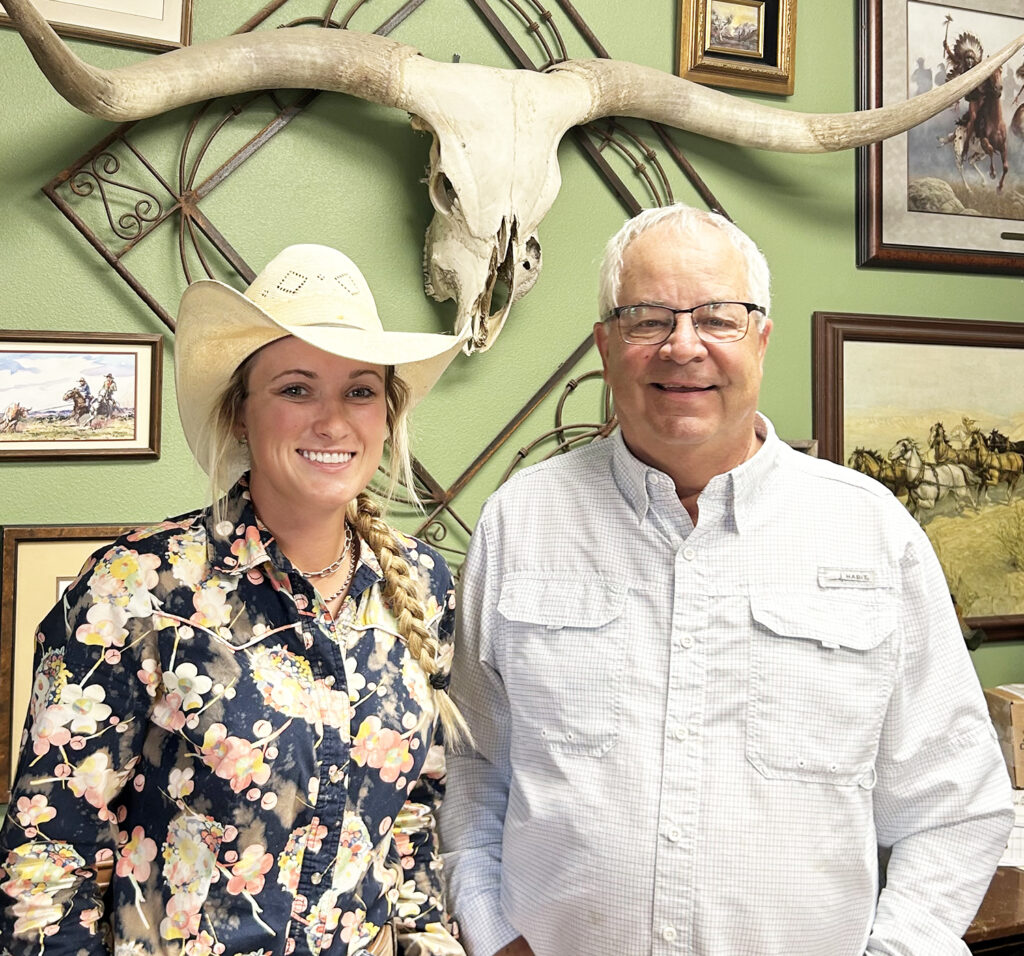Women with Grit, Guts, and a Horse
In the 1830s, young men given the job of herding cattle became known as cowboys. Nearly a century later, Lucille Mulhall (left) brought her popular rodeo show to New York City and became the first to be nationally known as a cowgirl.
In fact, Lucille so impressed Teddy Roosevelt with her riding skills that, legend has it, he promised an invitation to his inaugural parade if she could rope a wolf. Three hours later, she returned — dragging a dead wolf behind her.
Today, cowgirls play a vital role in shaping the culture and economy of Texas, blending tradition with modernity as they uphold the rugged, independent spirit of the West while driving the success of the state’s vast agricultural industry.
HOMEGROWN COWGIRLS AND COWBOYS
Locally, we need only go as far as Schwertner, to Capitol Land and Livestock — one of the nation’s largest cattle dealers, to learn more. President/CEO Jim Schwertner grew up in the business alongside his father, Eugene, who founded the company in 1946 and Jim is proud to employ the most cowboys in Central Texas. His 14 full-time and 14 contract cowboys work more than 21,000 acres in northern Williamson County in much the same way Old West cowboys did.
The cowboy culture is unique, Jim says, explaining that one of the unwritten cowboy codes, Ride for the Brand, originated in the Old West, but is still well understood today.
The brand — the trademark used for livestock identification — represents a cowboy’s pride and dedication to the ranch owner to protect the brand as if it were his own. Jim says, “You do not micromanage cowboys, you assign them jobs, then leave them alone to accomplish them. Loyalty and honesty are a big part of the cowboy credo.”
Tom Madden, Jim’s general manager, had the pleasure of hiring the company’s first full-time cowgirl. Watching Merideth Scroggs rope one afternoon, he said to himself, “She’s the real deal!” and quickly promoted her from contract to full-time cowgirl.
Merideth’s father, himself a horse trainer and bull rider, took her under his professional wing and dedicated himself to her training. By age 4, she was competing in rodeos and training mean ponies — the kind that throw and bite you. She began roping at age 10 and by 13, she and her father were making extra cash catching loose cattle for ranchers.

A DAY IN THE LIFE
Merideth and the other full-time cowboys begin their day at 6am, loading two horses and saddles into their trailers before heading out to the pastures. Cowboys bring their own horses, as they are particular about them, and for good reason. Merideth says a good roping horse can cost as much as $30,000. The company then provides facilities, feed, and hay for up to five horses, along with a truck and trailer.
At Capitol Land and Livestock, each cowboy or cowgirl is responsible for overseeing 1,500 acres and more than 1,500 head of cattle, valued north of $3 million. Merideth’s typical day involves tracking her herd, checking their feed and water, mending fences, and roping and doctoring any sick cattle.
IT’S A CALLING
Choosing a career of unrelenting hard work, cowboys and cowgirls are athletes in their own right. They work outdoors in all types of weather, confront the harsh realities of livestock deaths and injuries, and face constant dangers working with large animals. Despite these challenges, Merideth says the pros far outweigh the cons. She relishes the outdoors, the independence, and the fact that no two days are alike. The work is physically demanding but honest, leaving her with a profound sense of accomplishment.
While practically an extension of herself, horses are Merideth’s pride and joy. Her deep love for them has instilled in her a fierce determination to quietly observe and learn all she can. Even after 10-hour days, six days a week, Merideth still finds joy in spending her spare time with her horses. On nights and weekends, she gives riding lessons, enjoying the balance between personal interaction and the solitude of her regular workweek.
PERKS, PARDNER
Being a cowgirl does have its benefits. Merideth has participated in parades and starred in a photo shoot for a boot company. One of her most exciting moments was when she was asked to attend the San Antonio rodeo to help country music’s Tanya Tucker wrangle her horses. The plan for Tanya to ride out onstage was scrapped at the last minute when her manager deemed it too dangerous. “Tanya was madder than a wet hen,” Merideth recalls.
So, while times have changed, both Lucille Mulhall and Merideth Scroggs embody the same core values and adventurous spirit that celebrate the cowgirl ethos—a treasured part of our history that remains alive and well today.
Visit the National Cowgirl Museum and Hall of Fame online at Cowgirl.net.
